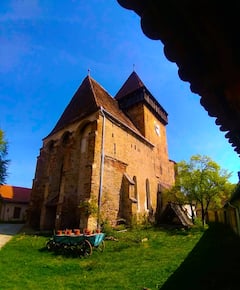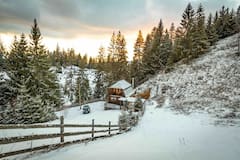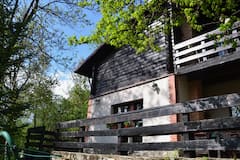Romania is a place full of history, where the myths and the fairy tales of a mysterious past lie all over the ancient houses and castles. Photos of Romania will only show you its beauty, but that’s something you can see in every country of the world. To acknowledge the wonders of the past times and the magic in the legendary truths about Romanian destinations, you need to visit the historical sites and savor the satisfying wonders by entering the old times. Do you dare to visit the castle of the infamous Count Dracula? If not, you’re welcome to visit seven other castles where the lords of the Romanian nations formerly ruled the land.
1. Bran Castle: The Home of Count Dracula

Bran Castle is a national monument and landmark in Romania; it is situated near Bran Village and Braşov. The fortress is on the border between Transylvania and Wallachia.
Commonly known as “Dracula’s Castle,” it is often referred to as the home of the title character in Bram Stoker’s Dracula. No one knows for sure; however, the history of the castle has only tangential associations with Vlad the Impaler, Voivode of Wallachia. We will talk about his real castle in another paragraph in this article.
Bran Castle is now a museum open to tourists, displaying art and a furniture collected by Queen Maria. The castle is still shrouded in an aura of mystery, myth, intrigue, and the magic of this beautiful place and its queen.
You can view the interior on your own or with a guided tour. At the bottom of the hill is a small open-air museum park exhibiting traditional Romanian peasant buildings (cottages, barns, etc.) from across the country
Bran Castle
Address: Strada General Traian Moșoiu 24, Bran 507025
Price: from 35 RON (8 USD)
Opening Hours: Mon 12:00 pm to 6:00 pm | Tue–Sun: 9:00 am to 6:00 pm
Duration: around 1.5 hours required.
Contact: +40 268 237 700
Website: Bran Castle
Tip from tour guide



Have you ever heard of "Dracula"? Sure you have heard!! But if you want to know about the historical character "Vlad the Impaler" you better visit Comana, he was assassinated close by, and his remains are probably buried at the monastery he built there. You can also visit the beautiful natural park on the Neajlov River. It is just an hours' drive from Bucharest.
2. Peles Castle

Peles Castle is a Neo-Renaissance castle in the Carpathian Mountains, near Sinaia, in Prahova County and it was constructed for King Carol I. By form and function, Peleş is a palace, but it is consistently called a castle. The complex is composed of three monuments: Peleș Castle, Pelișor Chateau, and Foișor Hunting Lodge.
Kaiser Franz Joseph I of Austria-Hungary visited the castle on October 2, 1896 and wrote about it in his journal. He was astonished by the place, and this quote says it all:
The Royal Castle, among other monuments, is surrounded by an incredibly lovely landscape with gardens built on terraces, all at the edge of a dense forests. The castle itself is very impressive through the riches it has accumulated: old and new canvases, old furniture, and weapons. Everything in the castle is tasteful.
Peles Castle
Address: Aleea Peleșului 2, Sinaia 106100
Price: from 30 RON (7 USD)
Opening Hours: Tue, Thu to Sun 9:15 am to 4:15 pm | Wed 11:00 am to 04:15 pm
Duration: around 1 hour required.
Access: 95 km from the Otopeni International Airport
Contact: +40 244 310 918
Website: Peles (in Romanian)
3. Corvin Castle

Corvin Castle, also known as Hunyadi Castle or Hunedoara Castle, is a Gothic Renaissance castle in Hunedoara, Romania. It is one of the largest castles in Europe and is at the top of the seven wonders of Romania.
The castle is one of the most important properties of John Hunyadi, and it was transformed during his reign from a strategically enforced point and an impressive home. With the passing of the years, the masters of the castle had modified its look, adding towers, halls, and guest rooms.
The Hunyadi Castle was constructed on the site of an older fortification on a rock above a small river. You will love this castle for its large and imposing structure, tall towers, bastions, inner courtyard, diversely colored roofs, and myriads of windows and balconies decorated with stone carvings.
Corvin Castle
Address: Strada Castelului 1-3, Hunedoara 331141, Romania
You might be interested in these Airbnbs!
4. Sturdza Castle

Sturdza Castle in Miclauseni, also known as Sturdza Palace, is a Gothic-style castle built between 1880 and 1904 by George Sturza and his wife, Maria. Sturdza Castle had many valuable collections of books (a collection estimated to 60,000 pieces) and documents of the time, paintings, jewelry, several medieval costumes, weapons, and many other valuable items. Many of the rare objects, mostly the books, were burnt by Russian soldiers.
The last heir of the castle donated the castle and the park that surrounds it to the Roman Episcopacy. During the communist period, the palace was turned into a warehouse for explosive material and later on was an orphanage. It was never restored during this period, so it gradually degraded.
The restoration process only began in 2001 when the Metropolitan Church of Moldavia and Bukovina claimed the castle. With the help of some old photos of the castle, it was rebuilt exactly like the original, in a Gothic architectural style with Baroque elements.
Sturdza Castle
Address: Miclauseni 707066, Romania
Opening Hours: Sat and Sun 12:00 am to 5:00 pm
Duration: around 2 hours required.
Access: 69 km (42.8 mi) from the Iasi International Airport
Contact: +40 728 880 575
5. Karolyi Castle

The Karolyi Castle was originally built as a fortress in the 14th century. It was converted to a castle in 1794, undergoing further transformations during the 19th century. It is surrounded by a park covering about 30 acres (12 hectares) and contains a great variety of species of trees and plants.
The history of the castle is closely related to the noble family Karolyi, who built its first home on the current spot of the castle back in the 15th century. Initially, the building was fortified, but later it was transformed into a defensive edifice against the Turks. In 1792, however, it was transformed into a castle in the Baroque style.
The castle is the most important tourist destination in Satu Mare County and hides many legends. Stories about the deep tunnels through which Francis Rakoczi used to escape on the back of his horse when chased by enemies, or the basement full of riches confiscated by the Nazis remind us about those who lived here in the old times.
Karolyi Castle
Address: Castelul Karolyi, Carei 445100
Opening Hours: Tue to Sun 9:00 am to 5:00 pm
Access: 47 km (29 mi) away from the Satu Mare International Airport
Contact: +40 261 864 981
6. Vlad Tepes Castle

Vlad Tepes Castle, also known as Poenari Citadel or Poenari Castle, is a ruined castle in Romania, notable for its connection to Vlad the Impaler. The castle is located on the plateau of Mount Cetatea, facing the west side of the Transfăgărășan, on a canyon formed on the Argeș River valley, close to the Făgăraș Mountains.
Poenari Castle was constructed around the beginning of the 13th century by Wallachians. It was very popular in its time, especially because of the impossibility to conquer it. However, the Poenari Castle was abandoned and left in ruins, and destroyed by an earthquake in the 19th century. Only the legends of Dracula and Vlad Tepes have kept it alive for centuries.
One of the most interesting things about Vlad Tepes Castle it is that if you want to visit it, you have to climb 1,480 concrete stairs.
Vlad Tepes
Website: Vlad Tepes (in Romanian)
7. Pekri Castle

On the hill of Ozd Village, Pekri Lőrinc, was built in 1682 by the headman of Rakoczi Ferenc IIone in the Gothic style. It is a rectangular-shaped castle with bastions in the corners.
The last owner of the castle was Baroness Ilona Teleki, who ordered the rebuilding of the castle after it was burnt in 1732. Woods surround the mansion, and for a long time, it was famous for its park and the lake in front of it.
The building hosted a kindergarten, a school, a cultural center, and the office of the Agricultural Cooperative for Production, which remained in the castle until it was retroceded to Mrs. Jude Maria, a French heiress. After retrocession, she donated it to the Bonus Pastor Foundation that decided to renovate the building and its surrounding annexes.
Work is still in progress, but you can visit the gorgeous surroundings and the interior of the castle.
8. Iulia Hasdeu Castle

The Iulia Hasdeu Castle is named after the historian and politician Bogdan Petriceicu Hasdeu’s daughter. She died at the age of 19, an event that dramatically shook and changed Hasdeu’s life and helps him decide to build the folly house, in the form of a small castle. Work began in 1893 after Hasdeu claimed that Iulia Hasdeu provided the plans for building the castle during communications as a spirt.
Since 1994 the Iulia Hasdeu Castle has been housing the “B.P.Hasdeu” Memorial Museum, so you can visit it and discover more facts of this area’s history, myths, and legends. The museum displays furniture, personal belongings from the Hasdeu family, photos and original documents, manuscripts, Hasdeu’s reviews, and many pictures taken by Nicolae Grigorescu and Sava Henția.
Iulia Hasdeu Castle
Address: Bulevardul Carol I 199, Câmpina 105600
Price: from 10 RON (2.32 USD)
Opening Hours: Tue to Sun 9:00 am to 4:00 pm
Duration: around 1.5 hours required.
Access: 82 km (~59 mi) away from the Otopeni International Airport
Contact: +40 244 335 599
Website: Hasdeu Museum
Beware of Count Dracula
As you can see from this article, the famous Bran Castle is not the home of Count Dracula. His real home is the Poenari Castle (check castle #6). Thanks to Bram Stoker, all the world knows that the Bran Castle is the place where the infamous Vlad Tepes thrust spikes into the criminals of Wallachia.
History
Get Trip101 in your inbox
Unsubscribe in one click. See our Privacy Policy for more information on how we use your data
























Create an account to